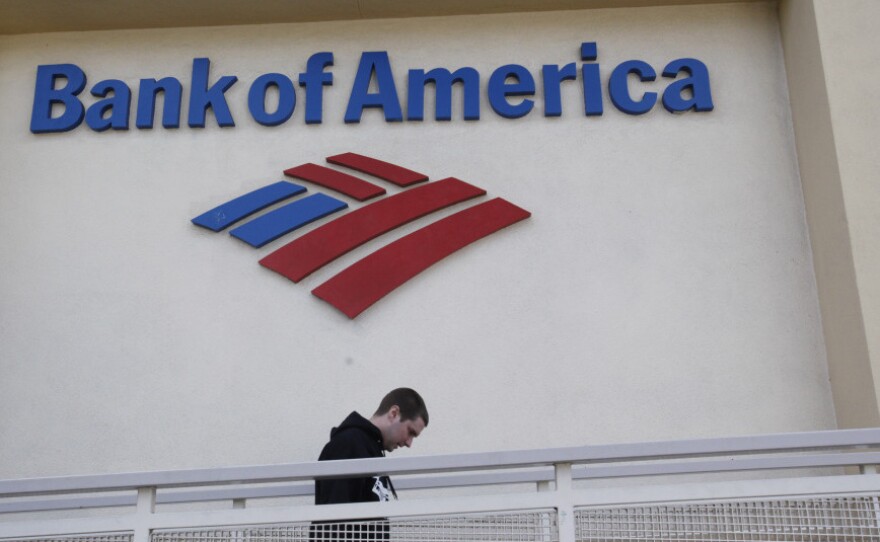The nation's biggest banks could face tens of billions of dollars in claims from investors in mortgage-backed securities. The investors, who include pension funds, want the banks to take back bad loans.
In mid-October, this issue sent Bank of America's stock price into a dive. The markets were spooked by a letter sent by a Texas law firm on behalf of major investors. The story got a lot of coverage, but it's now clear that those investors and others will have a tough time making their case.
Bill Frey, the owner of Greenwich Financial Services, has millions of dollars worth of sour mortgage-backed securities on his books.
But he says it's entirely possible that everyday Americans own these toxic investments, too. And when they lose value, he says, it's not the billionaires who really feel the pinch.
"It's hurting American pension funds," Frey says. "It's hurting your sixth-grade school teacher who's sitting in Daytona Beach [and] is having the security behind her pension eaten away."
The Boom Years
During the boom years, banks gave out hundreds of billions of dollars worth of home loans, packaged them into securities and sold them to investors as bonds. Pension funds, mutual funds and life insurance companies bought them because they promised good returns and relatively low risk.
Of course, it hasn't exactly worked out that way. Investors complain that the mortgages put into the securities weren't as good as promised, and that the banks aren't doing a good job of dealing with troubled loans.
So, Frey launched a campaign to protect investors' interests. He also stands to make a lot of money if he succeeds.
Frey wants some of the nation's largest banks to repurchase the bad loans. Many of the contracts that created the securities say that if the banks don't hold up their end of the deal, the investors can force them to take the loans back.
Three years ago, when he first started on this effort, Frey thought it would be easy to get other investors to sign on. It hasn't been.
"I was greeted as an insane person," he says.
Legal Hurdles
Frey now claims to have won over more than 150 investors. That should allow him to clear the first hurdle: getting legal standing to even start the process. But there are lots of other obstacles.
Before they can sue, investors have to provide evidence that the bank has breached the contract.
"You can't get access to the loan files unless you can prove that there's a problem with the loans," says attorney David Grais, who has worked with Frey. "And you can't prove that there's a problem with the loans until you've had access to the loan files."
Grais describes it as a catch-22. He thinks they've found work-arounds for these problems. But other challenges remain, including convincing investors to agree on strategy since they often have conflicting interests. And most investors don't even want their names made public.
The Challenge Of Rallying Investors
"The fact that it's taken as long as it has for really any noise to occur in spite of people being very upset and trying to do what is in the fiduciary best interests of their clients tells you it's a problem," says Scott Simon, who oversees mortgage-backed securities investments at PIMCO.
PIMCO, a prominent investment firm whose clients own mortgage-backed securities, is reportedly going after Bank of America to get the bank to take back loans that have gone bad.
Simon says it's hard to get groups of investors together. And once investors actually do file a suit, the banks have made it very clear that they won't roll over.
"It would be irresponsible on our part to settle the claims without doing a loan-by-loan analysis," says Bank of America spokesman Jerry Dubrowski, echoing the position of other banks. "You know, if there's a valid claim, we'll act responsibly and repurchase the loan. But if there isn't, we will contest it and we will defend our interests."
No Guarantees
Going through these claims loan-by-loan will be time-consuming and the legal fees will add up fast for investors -- without any guarantee of success.
"So, if they have the wherewithal to sue and to see their way through a miserable grinding litigation, I think they have a good chance of winning," says Christopher Whalen, a senior vice president with Institutional Risk Analytics.
If the investors win, he says, it could push the banks toward insolvency because the numbers are that big.
But banks appear to be betting that investors won't succeed on a large enough scale to do any real damage.
Copyright 2022 NPR. To see more, visit https://www.npr.org. 9(MDAzMjM2NDYzMDEyMzc1Njk5NjAxNzY3OQ001))







